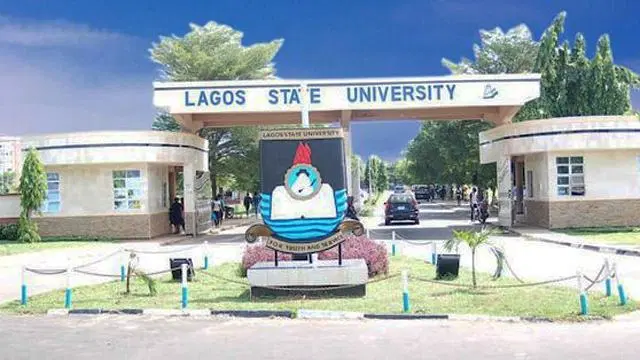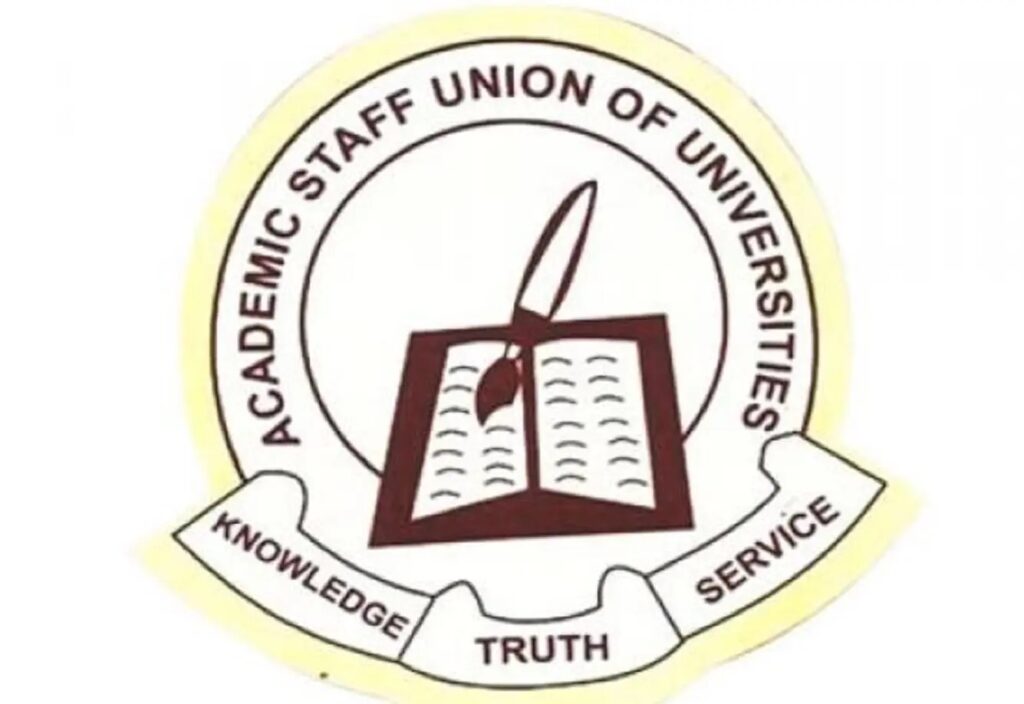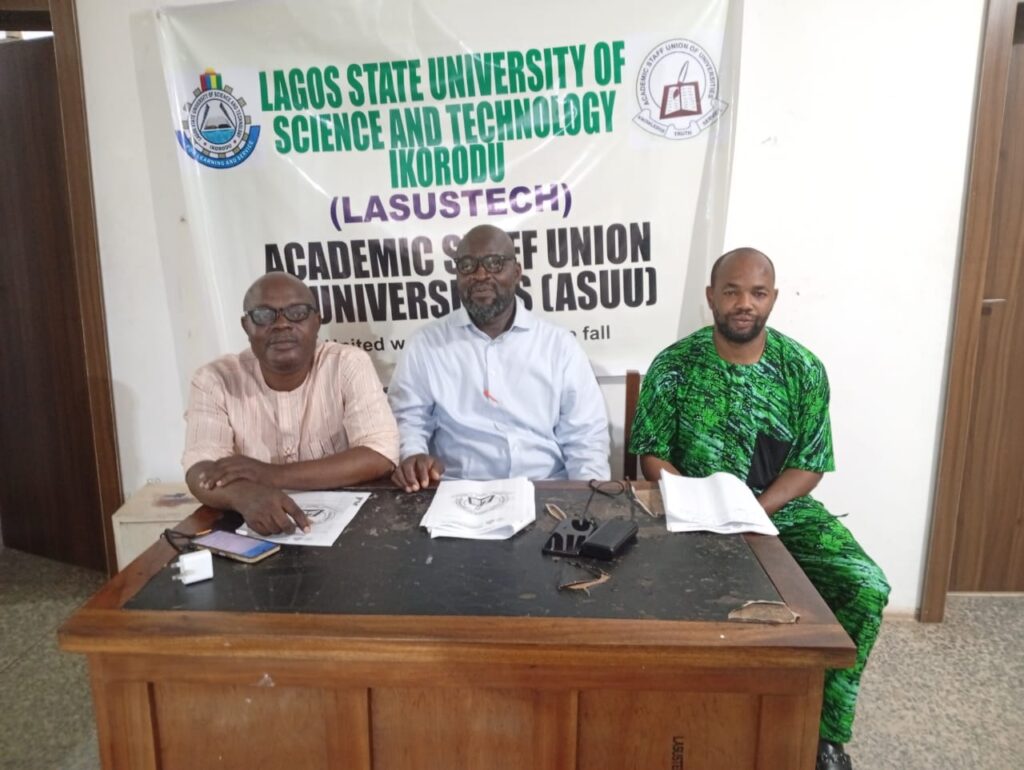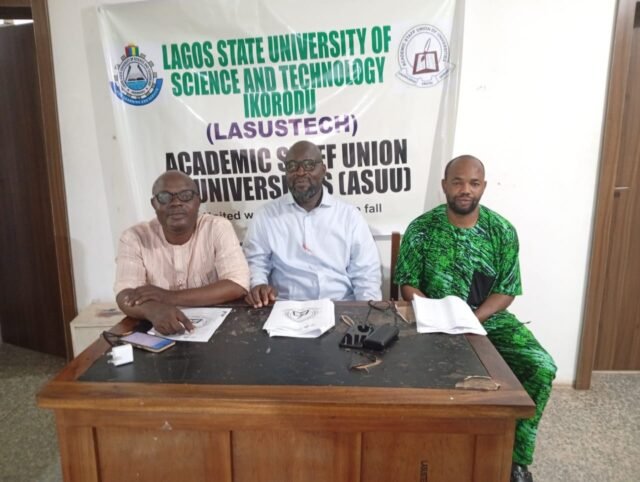In a firm show of dedication to safeguarding the future of higher education in Nigeria, the Lagos State University of Science and Technology (LASUSTECH) chapter of the Academic Staff Union of Universities (ASUU) has reaffirmed its commitment to revitalising the country’s public universities. At a press conference held on the LASUSTECH Ikorodu campus, ASUU LASUSTECH leaders emphasised that their struggle goes beyond wage disputes: it is fundamentally about rescuing a faltering public university system.
Table of Contents

Beyond Salaries: A Broader Mission
Comrade Yisa Oluwatoyin Anthonio, chairperson of the ASUU LASUSTECH chapter, emphasised that their struggle has always been rooted in seeking sustainable academic standards, institutional autonomy, and adequate infrastructure—objectives enshrined in the longstanding 2009 Federal Government–ASUU agreement. He lamented the federal government’s repeated failures to fully implement crucial provisions of that pact, which, among other things, promised fair remuneration, robust funding for research, and respect for university autonomy.
“Our fight is not merely for personal gain but for the survival of a system that shapes Nigeria’s intellectual and developmental future,” Anthonio declared. He noted that the real danger lies in allowing public universities to deteriorate unchecked—a scenario that would seriously undermine Nigeria’s competitive standing in the global knowledge economy.
The Realities of Neglect: Facilities, Research and the Brain Drain
Anthonio painted a sober picture of the state of several public universities. According to him, ageing infrastructure, decaying lecture halls, outdated or insufficient research equipment, and a prevailing lack of funding have combined to create a demoralising environment for academics and students alike.
He also raised the alarm over what he described as an accelerating “brain drain,” where talented staff and students seek opportunities abroad due to the absence of conducive working and learning conditions. This trend, he argued, is directly linked to dwindling institutional capacity, which restricts innovation, cripples research output and hampers the institutions’ ability to contribute meaningfully to national development.
“If nothing changes, our universities risk becoming relics in a knowledge-driven world,” Anthonio warned, noting that the erosion of research capacity and institutional credibility erodes not just individual morale but also public confidence in Nigeria’s higher education system.

ASUU LASUSTECH’s Strategy for Revitalisation
Against this backdrop, the LASUSTECH chapter of ASUU set out several key strategic priorities. First among them is the insistence on full implementation of outstanding agreements with the federal government. These include not only the 2009 FGN-ASUU Agreement, but also various Memoranda of Understanding (MoUs) and Memoranda of Action (MoAs) that remain unfulfilled. According to the union, these documents are vital for restoring dignity to the academic profession and repositioning universities as engines of transformation.
At the press conference, Anthonio reiterated the chapter’s willingness to explore all available avenues in pursuit of its goals: dialogue, stakeholder engagement and, if required, industrial action. But he also called on non-academic actors—especially students, parents, alumni, and members of the public—to support ASUU’s advocacy. The appeal was framed as a moral imperative: a shared responsibility to ensure that Nigeria retains a public university system capable of producing the kind of graduates who can meet the country’s evolving developmental needs.
“We’re not asking for charity; we are asking for commitment—commitment to quality education, to innovation, to research, and ultimately to a thriving nation,” Anthonio said. In his view, revitalised public universities are essential not only for academic excellence but also for nurturing human capital, critical thinking, and leadership that can drive sustainable national progress.
Stakes, Challenges and the Path Forward
The ASUU LASUSTECH chapter’s pronouncements highlight both the urgency and the complexity of the challenge facing Nigeria’s public university sector. On one hand, there is widespread recognition that higher education is indispensable to national development. Universities serve as crucibles of innovation, hubs for research-driven solutions to societal problems, and training grounds for future leaders. On the other hand, the path to revitalisation is strewn with practical obstacles: chronic underfunding, policy instability, insufficient infrastructure, administrative inertia, and sometimes strained relationships between academic unions and government.
The LASUSTECH chapter believes that reversing decline will require a coordinated effort. Critical to that effort, in their view, are:
- Full implementation of existing agreements: That means not only fulfilling past promises, but also ensuring accountability and transparency in how those commitments are honoured.
- Consistent and predictable funding for infrastructure and research: Without steady investment, laboratories and lecture theatres will continue to fall into disrepair, and researchers will struggle without access to essential tools and equipment.
- Support for academic staff welfare: Beyond salaries, this includes enabling continuing professional development, supporting academic mobility, and creating an environment where scholars can thrive rather than survive.
- Broader stakeholder engagement: Success depends not only on government honouring its obligations but also on students, parents, alumni, philanthropists, and civic society playing their part through advocacy, oversight, and constructive dialogue.

At the close of the press conference, the LASUSTECH chapter reaffirmed its commitment to stay the course. As Anthonio put it: “We will not relent until the government meets its obligations, and until Nigeria’s public universities can once again serve as beacons of hope and progress for our youth and future generations.”
The battle may be long and complex, but according to ASUU LASUSTECH, the alternative is unacceptable. Without concerted action and genuine political will, Nigeria risks watching one of its most important public goods—its public universities—languish, unable to respond to the educational and research demands of a rapidly changing world. In this struggle, ASUU LASUSTECH sees itself not merely as a union fighting for rights, but as a custodian of Nigeria’s intellectual future—and it is calling on all Nigerians to see it the same way.
Join Our Social Media Channels:
WhatsApp: NaijaEyes
Facebook: NaijaEyes
Twitter: NaijaEyes
Instagram: NaijaEyes
TikTok: NaijaEyes
READ THE LATEST EDUCATION NEWS















![Trailblazing Chef Hilda Baci Set to Cook 250 Bags of Rice in Daring Attempt to Break Record for World’s Biggest Jollof Pot [VIDEO] Hilda Baci](https://naijaeyesblog.com/wp-content/uploads/2025/09/hilda-1-180x135.avif)
























